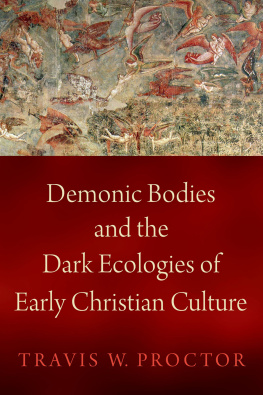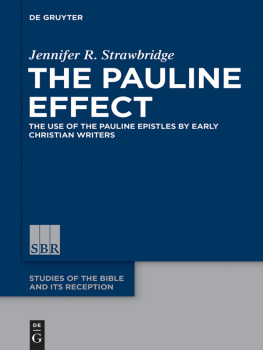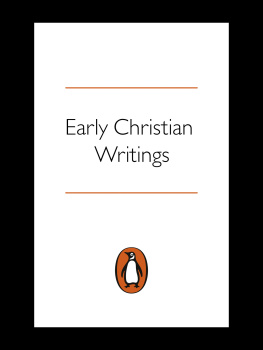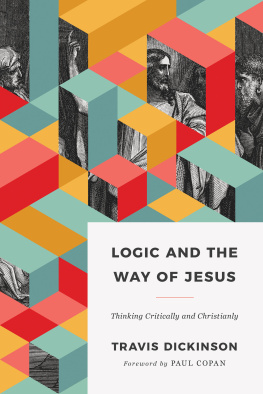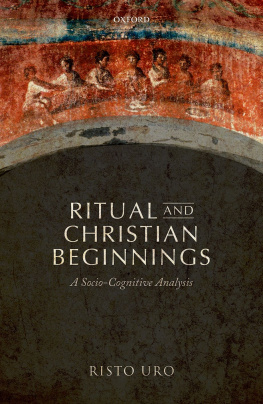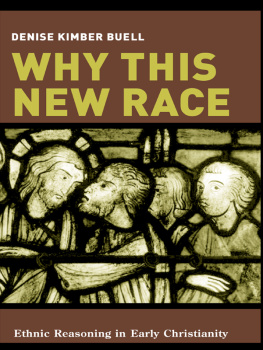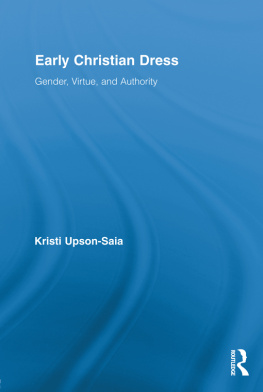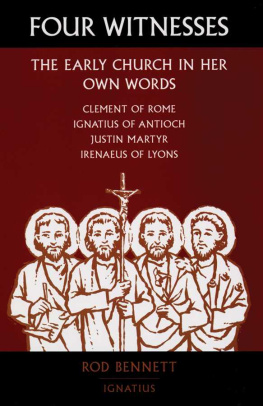Demonic Bodies and the Dark Ecologies of Early Christian Culture

Oxford University Press is a department of the University of Oxford. It furthers the Universitys objective of excellence in research, scholarship, and education by publishing worldwide. Oxford is a registered trade mark of Oxford University Press in the UK and certain other countries.
Published in the United States of America by Oxford University Press
198 Madison Avenue, New York, NY 10016, United States of America.
Oxford University Press 2022
All rights reserved. No part of this publication may be reproduced, stored in a retrieval system, or transmitted, in any form or by any means, without the prior permission in writing of Oxford University Press, or as expressly permitted by law, by license, or under terms agreed with the appropriate reproduction rights organization. Inquiries concerning reproduction outside the scope of the above should be sent to the Rights Department, Oxford University Press, at the address above.
You must not circulate this work in any other form and you must impose this same condition on any acquirer.
Library of Congress Cataloging-in-Publication Data
Names: Proctor, Travis W., author.
Title: Demonic bodies and the dark ecologies of early Christian culture /
Travis W. Proctor. Other titles: Rulers of the sea
Description: New York, NY : Oxford University Press, [2022] |
Originally presented as authors Thesis (Ph.D.University of North Carolina at Chapel Hill,
Department of Religious Studies, 2017) under the title: Rulers of the sea) |
Includes bibliographical references and index.
Identifiers: LCCN 2021049822 (print) | LCCN 2021049823 (ebook) |
ISBN 9780197581162 (hardback) | ISBN 9780197581186 (epub) | ISBN 9780197581193
Subjects: LCSH: Human bodyReligious aspectsChristianity
History of doctrinesEarly church, ca. 30600. |
DemonologyHistory of doctrinesEarly church, ca. 30600. |
Rites and ceremoniesHistoryTo 1500. | Church historyPrimitive and early church, ca. 30600.
Classification: LCC BT741.3.P76 2022 (print) | LCC BT741.3 (ebook) |
DDC 233/.5dc23/eng/20211109
LC record available at https://lccn.loc.gov/2021049822
LC ebook record available at https://lccn.loc.gov/2021049823
DOI: 10.1093/oso/9780197581162.001.0001
For my parents, with love and gratitude.
Contents
My fascination with demons began early in my academic journey, when I wrote an undergraduate thesis at Washington University in St. Louis on the demonology of Justin Martyrs Apologies. This book is in many ways a sequel to that initial venture, and thus over a decade in the making. A project with such a long history accumulates many debts.
First, I am deeply grateful to Bart Ehrman, whose patient guidance of this project in its form as a doctoral dissertation at UNC-Chapel Hill was essential to its success. Bart provided stalwart mentorship, attentive guidance, and careful feedback at every stage of the work. It would be a much inferior project, and I a much lesser scholar, if not for his direction.
Elizabeth Clark welcomed me into her courses and intellectual community with open arms, providing good company, stimulating conversation, and valuable feedback all along the way. Zlatko Plee and James Rives likewise provided careful comments and feedback, often supplying important yet patient correctives. Other faculty members at UNC similarly furnished support and guidance: Randall Styers, Juliane Hammer, David Lambert, Lauren Leve, Laurie Maffly-Kipp, Jodi Magness, Omid Safi, Jes Boon, and Brandon Bayne, among others.
I owe a deep debt to others who have read all or parts of the manuscript in its various forms: Annette Yoshiko Reed, Dale Martin, Jennifer Knust, Mark Letteney, Heidi Marx, and Dayna Kalleres.
Special thanks are due to the friends and colleagues who have inspired me with great conversation and supportive comradery: Andrew Aghapour, Matthew Hotham, Michael Muhammad Knight, Leif Tornquist, Nathan Schradle, Megan Goodwin, Ilyse Morgenstein-Fuerst, Kathy Foody, Anne Blankenship, Stephanie Gaskill, Shannon Schorey, Brook Wilensky-Lanford, Jenna Supp-Montgomerie, Shaily Patel, Jason Combs, Jason Staples, Brian Coussens, Erin Walsh, Julie Lillis, Jeremiah Bailey, CJ Schmidt, Brad Erickson, Bo Eberle, Benjamin White, and Pam Mullins Reaves.
I am appreciative of the support of the North American Patristics Society, whose Dissertation Completion Grant furnished additional time for research and writing. I am also indebted to the Dolores Zohrab Liebmann fund, which provided funding for teaching releases at important stages of my research and writing.
Before my time in North Carolina, I benefited from the great mentorship of Religious Studies and Classics faculty at Washington University in St. Louis, especially Roshan Abraham, Jonathan Schwiebert, and Daniel Bornstein.
Steve Wiggins has been an excellent editor who expertly guided me through the review and editing process. The anonymous readers at OUP, whose generosity was matched only by their careful attention to detail, made very helpful suggestions that improved the manuscript.
I owe thanks to the many students at UNC-Chapel Hill, Northland College, and, most recently, Wittenberg University, who have humored the ways in which demons seem to show up in all corners of Religious Studies courses.
I am grateful for my friends and former colleagues at Northland College, especially Kyle Bladow, Jessica Eckhardt, Dave Ullman, Kate Ullman, Emily Macgillivray, Kevin Schanning, Brian Tochterman, Ruth de Jesus, Erica Hannickel, Jason Terry, Leslie Alldritt, and Tim Doyle, who provided great intellectual comradery and friendship as this project was transitioning from its dissertation to book phases. Thanks are also (and especially) due to David Saetre, my predecessor in teaching Religious Studies at Northland, whose friendship and mentorship were invaluable as I began my postgraduate career.
At Wittenberg University so many have provided guidance and support, including Nancy McHugh, Chris Raffensperger, Michelle Mattson, Heather Wright, and Julius Bailey. My greatest debt of gratitude is owed to Jennifer Oldstone-Moore, whose friendship, mentorship, and support have been unfailing.
This project would not have been possible without the steadfast support of the library staffs at UNC-Chapel Hill, Northland College, and Wittenberg University. In particular, to Elizabeth Madsen-Genszler, Julia Waggoner, Suzanne Smailes, Karen Balliet, and Lori Judy: thank you.
No other person supported me over the length of this project more than Casey Proctor, whose intelligence, good humor, and abiding love make the work worth doing, and worth taking a break from. My two children, Caroline and Jackson, have constantly reminded me how fun it is to learn new things. My sister Heather and niece Madison have provided unwavering support and good laughs along the way. This book is dedicated to my parents, David and Tina Proctor, whose selfless care and unending support nurtured my love of learning, even when it took me far from home and into the unfamiliar worlds of academia. May this be a small token of gratitude for all that they have given me.
Demons and Bodies in the Ancient Mediterranean
This is a book about demonsthe residual spiritual offspring of primordial fallen angels (or fallen angels themselves) who waged an obstinate onslaught on humans in general, and the followers of Jesus in particular. Christian writers also warned that those who consort with demons are sometimes apt to take up their ways, falsehoods included. It will become clear that the present author is no exception, as this book-about-demons will at times shapeshift into a book-about-humans, and back again.

